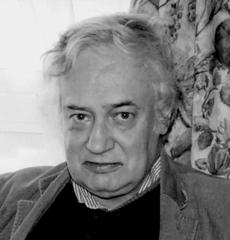Poetry and Politics: The Poetry of Richard McKane and the Poetry of the Taliban

Poetry lends itself uniquely to the work of promoting human rights. The combination of lyric writing, imagery, and the easily missed details of life in poetry can be an enlightening and memorable tool for raising awareness. It allows for the expression of anger, pain, and injustice in a way that seeks to reach others across time and difference.
Richard McKane is a poet and translator who very often incorporates issues of human rights into his work. In the forward to his 1998 book, Poet for Poet, Moris Farhi describes him as “a poet, the master of distilled emotions, [who] makes me feel that I ought to jump on Pegasus and charge at the world’s ills – or at the very least, joust with a windmill or two….” Focusing on and translating works mainly from Turkey and Russia, McKane often writes poems dedicated to other authors or activists who had the same revolutionary bent. Poet for Poet is comprised of his poems dedicated to others, as well as translations from other authors. Although I believe the full meaning of the poems is lost on those who are not very familiar with the political events and liberatory missions from which these poems and their authors came, from Anna Akhmatova to Alexander Pushkin, as well as more recent authors, McKane’s work poetry and translations are still fascinating examples of art and social commentary. One of his most interesting series in Poet for Poet is a set of octets written for the Russian author, Osip Mandelstam, while McKane was in Afghanistan in the late 1960s. The images and allusions shift frequently between Russian and Afghanistan, McKane’s life and Mandelstam’s, making it an intriguing and challenging series. For example, the fifth and sixth octets in the series are starkly contrasting:
V
‘The lizards’
The lizards slithered over the rocks
and the bats squeaked in the darkest vaults.
The storks kept their astronomic clocks
and returned to wilderness halts.
Tamerlane rased this to the ground
and massacred its inhabitants,
now only the Mujahiddin sound
and the clicking tongues of sycophants.
VI
Mandelstam in 1937
Snow, on snow, the veiled wonder of the plain:
it stretches to the utter limits of the steppe,
and in a hired room a poet cranes
his head back and tries to get in step
with the carnivorous age. For the first
time he sits down with paper and pencil,
and the millions exodus to the East whets his thirst
for life. So the Ode is written yet his life is killed.
– From Poet for Poet by Richard McKane [1]
 While Richard McKane’s work is often described as championing the rights of the oppressed, a newly released book, The Poetry of the Taliban, brings many questions and controversies to the role of the arts in human rights and (in the case of the Taliban) problematic nationalist projects. According to a discussion on BBC Radio 3’s program “Night Watch”, the book is a collection of Afghan poetry from the 1980s and 90s as well as poetry published on the Taliban’s website. The poems follow traditional Afghani poetic traditions and are written by Taliban sympathizers to criticize political actors and themes that represent, in the Taliban’s view, modernity. The BBC Radio 3 program discusses issues of “taste” in light of the many soldiers killed in Afghanistan in the last decade. The book, then, raises unsettling questions about the difference between seeking to understand and empathy, between the goals of the book and the goals of the poetry. At times, according to the book’s website, the poetry is not just critical of the outside world, but self critical of the Taliban as well.
While Richard McKane’s work is often described as championing the rights of the oppressed, a newly released book, The Poetry of the Taliban, brings many questions and controversies to the role of the arts in human rights and (in the case of the Taliban) problematic nationalist projects. According to a discussion on BBC Radio 3’s program “Night Watch”, the book is a collection of Afghan poetry from the 1980s and 90s as well as poetry published on the Taliban’s website. The poems follow traditional Afghani poetic traditions and are written by Taliban sympathizers to criticize political actors and themes that represent, in the Taliban’s view, modernity. The BBC Radio 3 program discusses issues of “taste” in light of the many soldiers killed in Afghanistan in the last decade. The book, then, raises unsettling questions about the difference between seeking to understand and empathy, between the goals of the book and the goals of the poetry. At times, according to the book’s website, the poetry is not just critical of the outside world, but self critical of the Taliban as well.
On the BBC Radio 3 program, special attention is given to a poem about the abundance of NGOs in the region and their sometimes problematic attitudes and actions. The radio commentators make an unsettling point in noting that similar sentiments regarding NGOs are found in many parts of the world and are thought to be appropriate and necessary – in fact, it could be argued that similar themes were expressed by Bertolt Brecht in the early 20th century. Yet, within the violence, patriarchy, and xenophobic worldview of the Taliban, the goal of art as manifesto and propaganda takes on an entirely different meaning.
[1] McKane, R (1998), Poet for Poet, London: Hearing Eye.









































